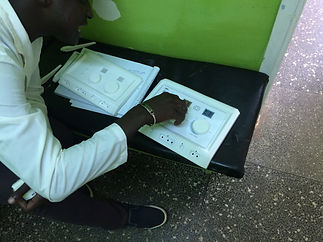
TU Delft Biomedical Engineering for Global Health Lab

Research
Our research focuses on designing and developing innovative medical equipment to increase global availability and to safely treat patients all over the world. Together with our PhDs, post-docs and students, we work on four different research lines.
To read our publications , click here.
1. Innovations for laparoscopic surgery
This research line focuses on increasing global access to laparoscopic surgery. Laparoscopic surgery is highly dependent on well-functioning medical equipment and biomedical engineering expertise is therefore of great need in this field.
We work on innovations to decrease current barriers to the use of medical equipment in LMIC settings, including:
-
A USB laparoscope for gasless laparoscopic surgery
-
A lifting device for gasless surgery with increased visibility
-
A laparoscopic holder to support solo surgery
-
An easily transportable laparoscopic tower
-
Context-specific electrosurgical unit
2. Context-specific design methodologies
In this research line, we work on the development of participatory design tools such as the context-specific design framework to design medical equipment that reduces barriers to use in LMICs.
We believe that we should expand our current design practices within the field of biomedical engineering to ensure that equipment fits the context of use in the often challenging settings of use in LMICs.
We therefore developed a context-specific design methodology that guides the designer or project team to in ensuring that the design requirements are based on the contextual factors that influence the use in LMICs.
3. Context studies
In this research line, we focus on conducting context research to understand the usage and barriers to the use of medical equipment in healthcare settings all over the world. These studies increase our understanding of local availability, requirements, and the need for innovations.
We published various studies focusing on the global availability of surgical equipment:
-
We studied the availability of general surgical equipment in 9 African countries
-
We studied the availability of laparoscopic equipment in 12 African countries based on surveys with surgical providers and 21 biomedical engineering technicians working in 6 different hospitals across Kenya on their experiences with laparoscopic equipment
-
To understand the root cause of these barriers, we detailed the surgical equipment journey, based on the experiences of biomedical engineering technicians working in Kenya
4. 3D printing of phantoms for surgical training
Together with our partners, we have identified the need for low-cost locally manufacturable training tools (such as phantoms) to enhance surgical skill development without the need for high-end expensive training labs.
We are currently workinging on the following innovations to increase access to surgical training in LMICs:
-
A training phantom for vesicovaginal fistula repair
-
A training platform for capsulorhexis as part of a cataract surgery
